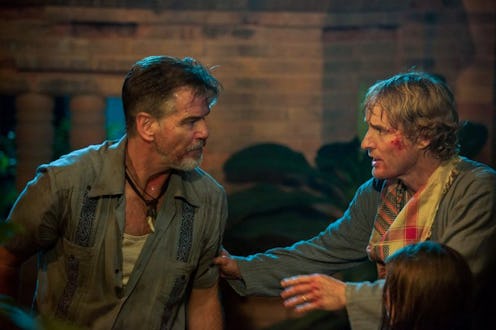Entertainment
Could 'No Escape' Really Happen?

Just over a week in theaters, and Owen Wilson's new film No Escape has already made waves, thanks to its terrifying and controversial portrayal of a coup in an unidentified Southeast Asia country. The movie is a rare foray into action-thriller territory for its star Wilson, who plays a young father on a business trip in the unnamed nation (the production filmed in Thailand, but co-writers John and Drew Dowdle agreed to not mention a real country so that the film could be firmly lodged in fiction, according to The Straights Times). During his trip, rebels begin a coup against the reigning regime. It might lead audiences to wonder, could No Escape could really happen? If so, it certainly presents a scary reality: the film plays out as a near-constant chase scene, with Wilson, his wife (played by Lake Bell) and their two children attempting escape while being confronted with politically motivated violence on all fronts.
No Escape is entirely fictional (although the political and ethnic tension it portrays sounds like it could be ripped from the headlines about real conflicts occurring across the globe). Still, film has a long and significant history of exploring the nature of political unrest. So, while No Escape may be fake, there are several other films that explore very real political troubles across nations and time periods, which are fictionalized yet grounded in reality, and range from underground revolt to all-out rebellion.
The Wind That Shakes The Barley
Cillian Murphy stars in this film about the Irish independence movement and subsequent civil war. He plays Damien O'Donovan, who joins the Irish Republican Army along with his brother Teddy. Just as Damien is about to leave Cork to practice medicine in London, he becomes embroiled in the Republican efforts. It's a truly heartbreaking film, and demonstrates why Murphy is one of the most under-utilized artists of his generation.
Hotel Rwanda
Hotel Rwanda is not only rooted in the real-life Rwandan genocide, but is also based on the lived experience of a hotel owner named Paul Rusesabagina (played by Don Cheadle) who, along with his wife Tatiana, offers refugees a shelter in his hotel. It has been compared to Schindler's List as a depiction of a rare humanitarian oasis within a wider political upheaval.
The Pianist
Schindler's List aside, Hitler's reign in Germany is rife with individuals' stories that can be adapted for film to explore the nature of ethnic violence. The Pianist is one such effort, which stars Adrien Brody as a Polish composer Wladyslaw Szpilman and is based on Szpilman's memoir about World War II. The film received four Oscars, including Best Director for Roman Polanski and Best Actor for Brody. It will break your heart, but it's an extraordinarily important film.
District 9
The futuristic science fiction-horror-thriller might be an unlikely candidate for a list of films centered on real political turbulence, but it actually draws much of its inspiration from Apartheid-era South Africa. It fictionalizes District 6 in order to explore xenophobia and segregation with fresh eyes. The parallels to the Apartheid are evident, but it uses the real narrative as a point of departure to focus on themes without villainizing either side of the equation.
The Last King Of Scotland
Though told from a fictional perspective, The Last King of Scotland both centers on a real person — Ugandan dictator Idi Amin — and draws its title from Amin's reported declaration of himself the king of Scotland. James McAvoy plays a personal physician to Amin, played by Forest Whitaker. Whitaker received the Best Actor Oscar for his performance.
Che
Steven Soderbergh directed this two-part epic starring Benicio Del Toro as the eponymous Che Guevara, the Argentinian-born Cuban Revolutionary who joined forces with Fidel Castro. Del Toro won best actor at Cannes for his performance in the film, which was initially screened as one — very long — unit. It also features Oscar Isaac pre-Inside Llewyn Davis, playing an interpreter.
While No Escape may not truly resemble reality, it does reflect a tendency to explore the nature of political upheaval and the potential for a coup in film. These films — spanning continents from South America to Europe to Africa, and occurring across the 20th century — hone in on the people behind these large-scale political events. They use individuals to humanize an overwhelming situation and to make an unthinkable experience relatable and accessible to a broader audience. They're often difficult to watch and frequently violent, but what would we get from averting our gaze?
Images: The Weinstein Company; IFC (2); Lionsgate; Focus Features; Tri-Star Pictures; Fox Searchlight